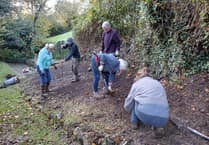Swifts are back and screaming through our skies once more as they catch their insect food on the wing. Having flown 3,400 miles from central and southern Africa, swifts are returning to their nests to breed. Sadly some won’t have nests, as we modernise and renovate our buildings removing the small cavities they nest in.
Swifts spend 10 months of the year entirely airborne. They eat and sleep in the sky, climbing to heights of two to three kilometres to sleep while gliding back down to lower altitudes. They bathe by flying slowly through rain and collect feathers floating on the breeze to line their nests.
Swifts once nested in caves and hollow trees but have been nesting in buildings for 2,000 years. They now depend on our buildings to survive, but modern buildings won’t provide homes for them without intervention from us. Swifts were added to the ‘Red List’ of endangered birds in 2021 – their numbers have fallen 40% in just the last ten years, but nest loss has a simple and cheap solution – swift bricks.
House developers can fit a hollow swift brick into a house wall for just £35 to provide a home to all cavity nesting birds – swifts, house martins, sparrows and starlings – all birds that are declining in the UK. The bricks do not require any maintenance and should last the lifetime of the building.
In the Netherlands, a swift brick is included by law in every new house built. A national campaign to do the same here was supported by a petition of over 100,000 signatures in 2023 and was debated in Parliament with the support of the Labour party. But now in government, there has been a retreat with Labour spokespeople relegating bats, newts and other wildlife as development-blockers.
However, an amendment has been tabled to the Infrastructure and Planning Bill currently going through Parliament to make swift bricks a condition of planning permission for new housing. If the government makes this small change in the law to make swift bricks mandatory, swifts will have a future in Britain.
Community projects like the Devon Swift Project support the last populations of swifts in rural villages, towns and cities by transforming Devon’s churches into stable, long-term nesting sites. Exeter Cathedral has been fitted with 128 nest chambers, and there have been installations in
38 churches to date, but with 620 churches across Devon, your local church may be in need of a ‘swift champion’ to get the ball rolling.
You can also help swifts by making your garden insect friendly – don’t use pesticides, let the grass grow a bit longer, and leave some wilder edges to encourage insects that swifts and so many other species depend on.
There is nothing quite like the summer sight of a group of swifts flying and screeching around our rooftops at speed, an impressive 60 mph! For everyone who loves to watch and hear swifts in our summer skies, let’s hope the government, developers and our communities will embrace these incredible birds.





Comments
This article has no comments yet. Be the first to leave a comment.